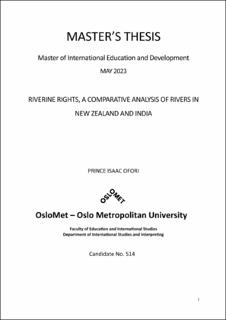| dc.description.abstract | Human protection of the natural environment by reason of the interdependent relationship has received increased attention in recent decades. From the mid-1800s through the Rio Conference to COP26 in Glasgow, 2021, activists have forged on until the emerging conferment of natural environmental rights. On the conferment and recognition of rights on elements of the natural environment, environmentalists opine that the most efficient approach is by first conferring legal personality on these elements. This study considered principally riverine rights. Adopting the legalist jurisprudence to confer legal personality on rivers, it is proposed that critical institutionalism be adopted in the establishment of a guardian institution for the exercise of the rights of the legal personality of the rivers. Nevertheless, for optimum functionality and realisation of the promises of environmental protection, it is proposed that environmental constitutionalism is the surest foundation with boldest legal force to sustain efforts towards protection of the environment. On this framework, this study adopts a multi-case study approach by documentary analysis of the the Te Awa Tupua (Whanganui River Settlement) Act 2017 of New Zealand and two reported law cases from India - Mohammed Salim v. State Of Uttarakhand And Others (2016 & 2017 Judgments) and Lalit Miglani v. State Of Uttarakhand And Others (2016 & 2017)- both of which sources confer legal personality on rivers Whanganui of New Zealand and Rivers Ganges and Yamuna of India respectively. Upon thematic and comparative analyses based on the required elements of critical institutionalism and environmental constitutionalism of the guardian institutions it is concluded that New Zealand by use of prolonged negotiations and statutory reform has a better framework for the recognition and enforcement of the riverine rights as compared to the judicial declaration approach by India. Realising the potential efficiency of the theoretical framework, it is recommended, among others, that states adopt and implement constitutional recognition of riverine rights with strong political will to adopt workable guardian institutions based on critical institutionalism. | en_US |
